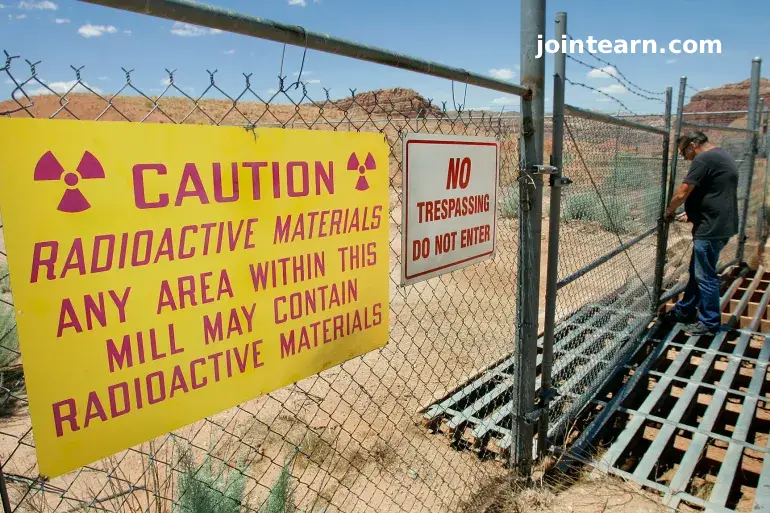
Authorities say suspects planned to transport radioactive material through Russia to China, reviving concerns over nuclear smuggling networks in the Caucasus.
Tbilisi Security Forces Foil Uranium Trafficking Attempt
TBILISI, October 25, 2025 — Georgia’s State Security Service has announced the arrest of three Chinese citizens in the capital, Tbilisi, on charges of attempting to purchase 2 kilograms (4.4 pounds) of uranium. The suspects were allegedly negotiating to buy the radioactive substance for $400,000, with plans to transport it through Russia and into China.
Authorities released video footage of the sting operation, showing security agents detaining the suspects during what they described as the “final stage” of an illegal transaction. Officials said the arrests were part of a broader investigation into transnational nuclear smuggling networks operating across the South Caucasus.
“The individuals were detained while negotiating the details of the illegal deal,” the agency said in a statement. “Their intent was to illegally acquire and transport radioactive material of high danger.”
China Connection and Transnational Coordination
According to the State Security Service, the smuggling operation was coordinated between China and Georgia. A Chinese national already residing in Georgia—who had overstayed his visa—was accused of recruiting “nuclear experts” to locate uranium deposits throughout the country.
Meanwhile, members of the criminal group in China allegedly provided logistical and financial support for the scheme. Authorities did not release the names of the suspects or confirm when the arrests took place, citing the sensitivity of the ongoing investigation.
The detained individuals face up to 10 years in prison if convicted of illegal possession and attempted trafficking of radioactive materials.
Growing Concerns Over Georgia’s Role in Nuclear Smuggling
Georgia, a former Soviet republic, has long been considered a key transit point for nuclear smuggling due to the remnants of Soviet-era research facilities and poorly secured stockpiles.
Since the collapse of the Soviet Union in 1991, the country has witnessed multiple high-profile arrests involving the illicit trade of uranium and other radioactive substances.
- 2019: Two people were detained for attempting to sell $2.8 million worth of uranium-238.
- 2016: Georgian and Armenian nationals were arrested in twin sting operations involving over $200 million worth of uranium-235 and uranium-238.
- 2023: A joint Georgian-Turkish investigation exposed a smuggling route connecting the Caucasus to the Middle East.
Security experts warn that these incidents underscore the continuing risks posed by unsecured nuclear materials in post-Soviet states, many of which still contain abandoned laboratories and unguarded storage facilities.
“The South Caucasus remains a vulnerability in the global fight against nuclear proliferation,” said nuclear security analyst Giorgi Bakradze. “Criminal networks exploit porous borders and limited local enforcement capacity.”
International Implications and Response
The arrests come amid renewed global focus on nuclear security and non-proliferation, particularly as geopolitical tensions rise between the United States, China, and Russia.
In Washington, U.S. officials expressed concern that uranium trafficking through Georgia could contribute to black-market supply chains for nuclear materials. The International Atomic Energy Agency (IAEA) has previously warned that any attempt to smuggle uranium, even in small quantities, represents a “significant security threat.”
Georgia has been working closely with Western partners, including the U.S. Department of Energy, to improve detection and monitoring at its borders. These partnerships have led to the installation of radiation scanners and the training of customs officials, though gaps persist.
“Each arrest is both a success and a warning,” said a senior Western diplomat in Tbilisi. “It shows the system can work—but also that the threat is far from eliminated.”
Historical Context: Legacy of the Soviet Nuclear Program
The Soviet Union’s extensive nuclear research network once spanned across Georgia and neighboring Armenia. When the USSR collapsed, many of these sites were abandoned without adequate safeguards, creating opportunities for smugglers to steal or repurpose radioactive materials.
Analysts note that many illegal traders target uranium-238 and uranium-235, which can be used in dirty bombs or, in sufficient quantities and enrichment, nuclear weapons.
Since 2000, Georgia has documented more than 40 incidents involving attempts to traffic radioactive substances, according to official data and IAEA records.
Conclusion: Renewed Call for Vigilance
The latest arrests underscore the persistent danger of nuclear material trafficking in the post-Soviet space and highlight the need for international cooperation to prevent the misuse of radioactive substances.
As the investigation continues, Georgian authorities are expected to share evidence with both Chinese and Russian officials under international counter-proliferation frameworks.
“This is not just a Georgian problem—it’s a global one,” said Bakradze. “Every successful seizure is a reminder that somewhere, someone else may be trying to do the same.”


Leave a Reply